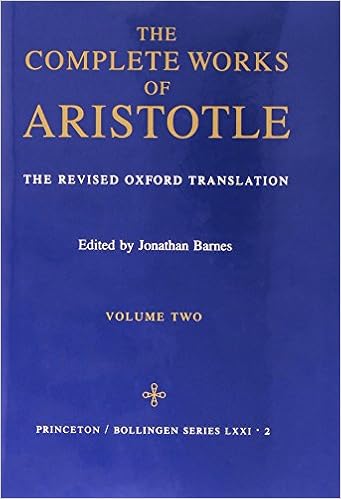
By Julie K. Ward
ISBN-10: 0521128471
ISBN-13: 9780521128476
ISBN-10: 0521874866
ISBN-13: 9780521874861
During this ebook, Julie okay. Ward examines Aristotle's notion concerning how language informs our perspectives of what's actual. First she areas Aristotle's thought in its old and philosophical contexts in terms of Plato and Speusippus. Ward then explores Aristotle's idea of language because it is deployed in numerous works, together with Ethics, themes, Physics, and Metaphysics, so that it will think of its relation to dialectical perform and medical rationalization as Aristotle conceived it.
Read Online or Download Aristotle on Homonymy: Dialectic and Science PDF
Similar greek & roman books
Read e-book online Beginning of Knowledge PDF
During this paintings Gadamer reminds us that philosophy for the Greeks used to be not only a query of metaphysics and epistemology yet encompassed cosmology, physics, arithmetic, drugs and the total achieve of theoretical interest and highbrow mastery. while Gadamer's e-book "The starting of Philosophy" handled the inception of philosophical inquiry, this publication brings jointly the majority of his formerly released yet by no means translated essays at the Presocratics.
Read e-book online Gorgias (Clarendon Plato Series) PDF
The Gorgias is a vibrant advent to principal difficulties of ethical and political philosophy. In solution to an eloquent assault on morality as conspiration of the vulnerable opposed to the powerful, Plato develops his personal doctrine, insisting that the advantages of being ethical consistently outweigh any merits to be received from immorality.
Download e-book for iPad: New Essays on Ancient Pyrrhonism by Diego E. Machuca
Scholarship on historical Pyrrhonism has made large advances during the last 3 many years, thank you specially to the cautious reexamination of Sextus Empiricus extant corpus. development in this momentum, the authors of the 8 essays gathered the following study one of the most vexed and interesting exegetical and philosophical questions posed via Sextus presentation of this kind of skepticism.
New PDF release: The Complete Works of Aristotle (The Revised Oxford
The Oxford Translation of Aristotle used to be initially released in 12 volumes among 1912 and 1954. it truly is universally famous because the ordinary English model of Aristotle. This revised version comprises the substance of the unique Translation, just a little emended in gentle of contemporary scholarship; 3 of the unique types were changed by means of new translations; and a brand new and enlarged number of Fragments has been further.
- Plato and Nietzsche: Their Philosophical Art
- Virtue Is Knowledge: The Moral Foundations of Socratic Political Philosophy
- Aristotle's Physics: A Critical Guide
- Ancient Philosophy, Mystery, and Magic: Empedocles and Pythagorean Tradition
- Time for Aristotle (Oxford Aristotle Studies)
Extra resources for Aristotle on Homonymy: Dialectic and Science
Example text
For example, I think that he employs homonymos ¯ in passages such as Phd. 133d2–3, and Tim. 52a4–5 to point out the disparate ontological status between Forms and sensible particulars. 65 It may be argued that in observing their differences, Aristotle is justly exploiting a weak point within Plato’s account when he states that it is mere homonymy to call both a living human and a wooden human figure “human” (991a7–8). The force of 63 64 65 The lines common to both texts (991a6–8, 1078b36–1079a3) include: “if the form is not the same [in Form and particular], the things will be homonymos” ¯ (εij dε; mh; to; aujto; εi\doı, oJmwvnuma a]n εi[h .
It is possible to pose the scholarly debate as spanning two extremes, with one side finding little in common, and the other, a great deal. One side of the 26 Theory of Homonymy in Categories 1 and Precursors debate is given by E. Hambruch (1904), who claims that although Speusippus influenced Aristotle in his linguistic approach to homonymy, there are substantial differences between the two accounts. Specifically, Hambruch holds that, for Speusippus, the referents of homonymous or synonymous names are words and not things, and this fact constitutes the main line of difference.
79a1– 2), so that the two kinds are also ontologically different (cf. Phd. 79a3–4). Using these premises, he constructs an analogical argument to show that since the soul is more like the invisible and unchanging things, it is likely to be immortal (Phd. 80a10–b3). So, in this context, it is reasonable to assume that homonymos ¯ is chosen to reflect the cases in which particulars share the same name but not the same nature, nor, by implication, the same definition, as Forms. A use of homonymos ¯ similar to the present one at Phd.
Aristotle on Homonymy: Dialectic and Science by Julie K. Ward
by Joseph
4.1



